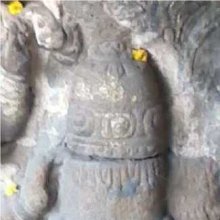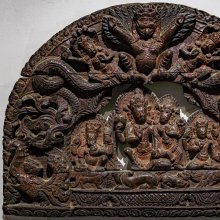Ashiva, Aśiva: 14 definitions
Introduction:
Ashiva means something in Hinduism, Sanskrit, Jainism, Prakrit, Hindi. If you want to know the exact meaning, history, etymology or English translation of this term then check out the descriptions on this page. Add your comment or reference to a book if you want to contribute to this summary article.
The Sanskrit term Aśiva can be transliterated into English as Asiva or Ashiva, using the IAST transliteration scheme (?).
Alternative spellings of this word include Ashiv.
Images (photo gallery)
In Hinduism
Shaktism (Shakta philosophy)
Source: Google Books: ManthanabhairavatantramAśiva (अशिव) refers to “one who is inauspicious”, according to the Manthānabhairavatantra, a vast sprawling work that belongs to a corpus of Tantric texts concerned with the worship of the goddess Kubjikā.—Accordingly, while describing the signs of one who is not a Siddha: “He is excessively tall, bald, deformed, short, dwarfish, his nose is ugly or he has black teeth and is wrathful . Some of his limbs are missing and is deceitful, cripple and deformed, foolish, inauspicious [i.e., aśiva], envious, deluded, badly behaved, and violent; without any teacher, he is devoid of the rites, he maligns the Krama without cause, he is not devoted to the Siddhas, he (always) suffers and is without wisdom. He is (always) ill and one should know that he is (always) attached (to worldly objects) and has no scripture. He has no energy and is dull and lazy. Ugly, he lives by cheating and, cruel, he is deluded, and devoid of (any) sense of reality. Such is the characteristic of one who is not accomplished (asiddha) in a past life”.

Shakta (शाक्त, śākta) or Shaktism (śāktism) represents a tradition of Hinduism where the Goddess (Devi) is revered and worshipped. Shakta literature includes a range of scriptures, including various Agamas and Tantras, although its roots may be traced back to the Vedas.
Purana and Itihasa (epic history)
Source: archive.org: Shiva Purana - English TranslationAśiva (अशिव) refers to “inauspicious”, according to the Śivapurāṇa 2.3.8.—Accordingly, Sage Nārada said to Menā:—“O Menā, O king of mountains, this daughter of yours has all auspicious signs. Like the first digit of the moon she will increase day by day. She will delight her husband, and heighten the glory of her parents. She will be a great chaste lady. She will grant bliss to everyone always. I see all good signs in the palm of your daughter, O lord of mountains. There is an abnormal line also. Listen to the indication thereof. Her husband will be a naked Yogin, without any qualities. He will be free from lust. He will have neither mother nor father. He will be indifferent to honours. His dress and manners will be inauspicious [i.e., aśiva-veṣa]”.

The Purana (पुराण, purāṇas) refers to Sanskrit literature preserving ancient India’s vast cultural history, including historical legends, religious ceremonies, various arts and sciences. The eighteen mahapuranas total over 400,000 shlokas (metrical couplets) and date to at least several centuries BCE.
Languages of India and abroad
Sanskrit dictionary
Source: DDSA: The practical Sanskrit-English dictionaryAśiva (अशिव).—a.
1) Inauspicious, causing or threatening mischief; अशिवा दिशि दीप्तायां शिवास्तत्र भयावहाः (aśivā diśi dīptāyāṃ śivāstatra bhayāvahāḥ) (ruruvuḥ) Rām.
2) Unlucky, unfortunate.
3) Unkind, unfriendly, envious.
4) Pernicious, dangerous.
-vaḥ Name of a certain divine being.
-vā A female demon or goblin.
-vam 1 Ill-luck, misfortune; grief; आपूरितं विमानं तद्भय- शोकाशिवाश्नुभिः (āpūritaṃ vimānaṃ tadbhaya- śokāśivāśnubhiḥ) Rām.7.24.5.
2) Mischief.
Source: Cologne Digital Sanskrit Dictionaries: Shabda-Sagara Sanskrit-English DictionaryAśiva (अशिव).—mfn.
(-vaḥ-vā-vaṃ) Unlucky, unfortunate. E. a neg. śiva propitious.
Source: Cologne Digital Sanskrit Dictionaries: Benfey Sanskrit-English DictionaryAśiva (अशिव).—I. adj. inauspicious, [Rāmāyaṇa] 3, 29, 11. Ii. n. ill-luck, ib. 3, 30, 3.
Aśiva is a Sanskrit compound consisting of the terms a and śiva (शिव).
Source: Cologne Digital Sanskrit Dictionaries: Cappeller Sanskrit-English DictionaryAśiva (अशिव).—unlucky, evil. [neuter] ill luck.
Source: Cologne Digital Sanskrit Dictionaries: Monier-Williams Sanskrit-English Dictionary1) Aśiva (अशिव):—[=a-śiva] mf(ā)n. unkind, envious, pernicious, dangerous, [Ṛg-veda; Atharva-veda; Mahābhārata] etc.
2) [v.s. ...] m. Name of a demon causing disease, [Harivaṃśa 9560]
3) [v.s. ...] n. ill-luck, [Ṛg-veda i, 116, 24; x, 23, 5; Mahābhārata etc.]
Source: Cologne Digital Sanskrit Dictionaries: Yates Sanskrit-English DictionaryAśiva (अशिव):—[a-śiva] (vaḥ-vā-vaṃ) a. Unfortunate.
Source: DDSA: Paia-sadda-mahannavo; a comprehensive Prakrit Hindi dictionary (S)Aśiva (अशिव) in the Sanskrit language is related to the Prakrit word: Asiva.
[Sanskrit to German]
Sanskrit, also spelled संस्कृतम् (saṃskṛtam), is an ancient language of India commonly seen as the grandmother of the Indo-European language family (even English!). Closely allied with Prakrit and Pali, Sanskrit is more exhaustive in both grammar and terms and has the most extensive collection of literature in the world, greatly surpassing its sister-languages Greek and Latin.
Hindi dictionary
Source: DDSA: A practical Hindi-English dictionaryAśiva (अशिव) [Also spelled ashiv]:—(a) inauspicious; pernicious, baleful, evil; (nm) the evil; hence ~[tā] (nf).
...
Prakrit-English dictionary
Source: DDSA: Paia-sadda-mahannavo; a comprehensive Prakrit Hindi dictionaryAsiva (असिव) in the Prakrit language is related to the Sanskrit word: Aśiva.
Prakrit is an ancient language closely associated with both Pali and Sanskrit. Jain literature is often composed in this language or sub-dialects, such as the Agamas and their commentaries which are written in Ardhamagadhi and Maharashtri Prakrit. The earliest extant texts can be dated to as early as the 4th century BCE although core portions might be older.
Kannada-English dictionary
Source: Alar: Kannada-English corpusAśiva (ಅಶಿವ):—[adjective] not auspicious; unfavourable; causing distress; inauspicious.
Kannada is a Dravidian language (as opposed to the Indo-European language family) mainly spoken in the southwestern region of India.
See also (Relevant definitions)
Partial matches: Shiva, A, Civa.
Starts with: Ashivacara, Ashivachara, Ashivarava, Ashivashamsin, Ashivavesha.
Ends with (+24): Aghorashiva, Ahatashiva, Aparashiva, Aupashiva, Bhattashiva, Caturdharashiva, Dhirashiva, Gamvashiva, Girijashiva, Guhashiva, Harashiva, Indrashiva, Ishanashiva, Jnanashiva, Kalashiva, Kamashiva, Kavacashiva, Mahashiva, Mayashiva, Padmashiva.
Full-text (+143): Somasutra, Ashiv, Ashivacara, Samasutrapradakshina, Shivalaya, Ishvarasadma, Shivakshetra, Sudana, Hamsasvaran, Shivayatana, Shankarayatana, Sucitra, Abhavabhavana, Tiruvatikai, Jampukecuvaram, Riti, Kamapala, Bhavangana, Shivalya, Lingapitha.
Relevant text
Search found 43 books and stories containing Ashiva, A-shiva, A-śiva, A-siva, Aśiva, Asiva; (plurals include: Ashivas, shivas, śivas, sivas, Aśivas, Asivas). You can also click to the full overview containing English textual excerpts. Below are direct links for the most relevant articles:
Bhakti-rasamrta-sindhu (by Śrīla Rūpa Gosvāmī)
Verse 2.2.20 < [Part 2 - Ecstatic Expressions (anubhāva)]
Rig Veda (translation and commentary) (by H. H. Wilson)
Rig Veda 10.124.2 < [Sukta 124]
Mahabharata (English) (by Kisari Mohan Ganguli)
Maha Prajnaparamita Sastra (by Gelongma Karma Migme Chödrön)
Part 2.3 - Why celebrate the upavāsa of six days of fasting < [Section II.1 - Morality of the lay person or avadātavasana]
Jainism in Odisha (Orissa) (by Ashis Ranjan Sahoo)
Chaumukha at Gatesvara Siva Temple, Kundeswara < [Chapter 3: Survey of Jaina Antiquities in Odisha]
Archaeological importance of Kundeswar, Jagatsinghpur < [Chapter 3: Survey of Jaina Antiquities in Odisha]
Brahmanidevi Temple, Naguan (Jajpur) < [Chapter 3: Survey of Jaina Antiquities in Odisha]
Later Chola Temples (by S. R. Balasubrahmanyam)
Temples in Kendatti < [Chapter VIII - Temples of Rajaraja II’s Time]
Temples in Arumbavur < [Chapter XIV - Temples of Rajaraja III’s Time]
Temples in Atti < [Chapter X - Temples of Rajadhjraja II’s Time]




